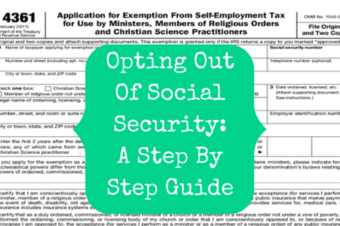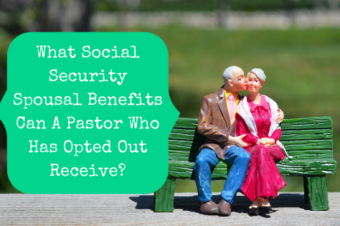
Someone wrote to me recently with some questions about Form 4361 that is used by clergy to opt out of Social Security. One of the questions was, how hard is it to get Form 2031 approved to revoke Form 4361 and opt back into Social Security? That is a very important question, so today we are going to address it.
What Is IRS Form 2031?
Let me start by explaining these forms. Form 4361 is what pastors use to opt out of participating in the Social Security system. Click on that sentence to learn more about it.
IRS Form 2031 is used to revoke Form 4361 and opt back into Social Security. It is an irrevocable election that makes you liable for self-employment tax and includes your ministerial earnings in Social Security and Medicare coverage.
Can You Use IRS Form 2031 Right Now?
I have heard from a number of pastors that opted out of Social Security when they were young and regretted it later on. I’ve heard from others who said that they now realize that they didn’t really have grounds to opt out and didn’t fully understand what they were proclaiming.
Does that mean that they can reverse their decision and opt back in with Form 2031?
No. At least not right now.
You see, Form 2031 has only been used on special occasions when Congress gave pastors a short window of time to opt back in. In 1978 and again in 1986 this option was made available. It was only a one-time opportunity and the election had to be made by the deadline of the tax return for the year after the law was passed.
The last opportunity to revoke exemption with Form 2031 was at the turn of the century. The Ticket to Work and Work Incentives Improvement Act of 1999 gave ministers a 2-year window in which they could change their minds about opting out of Social Security. The last deadline to opt back into Social Security was October 15, 2002. Suffice it to say, you’re too late now.
What Are Your Other Options?
Basically, you can’t opt back into Social Security with Form 2031 and there’s no guarantee that the opportunity to do so will ever appear again during your lifetime. What can you do, then?
First, if you really want to get back into the system, you can try to get the IRS to revoke your exemption. They have nullified a minister’s exemption because he did it solely for economic reasons, which is illegal. I don’t know anyone who has tried this, so let me know if you do.
If you don’t want to go to such extreme measures, put your own safety net in place. Provide for yourself that which the Social Security and Medicare system would have provided for you. Purchase life and disability insurance. Save for retirement, including Medicare Part A costs. This article explains what you need to do to make up for opting out of Social Security.
Finally, share your wisdom and experience with others. Let new pastors learn from your mistakes so that they don’t have to make the same ones. Just remember, though, that what is right for you isn’t necessarily right for everyone else. Opting out of Social Security is a personal decision and there isn’t one right or wrong answer.
If you would like to share your experience with opting out of Social Security, go ahead and do so in the comments!




29 Responses
Craig
April 20, 2020I got out of ministry for several years and am back now. During that sabbatical I had secular jobs during which my employers paid into Social Security. Will I receive credit for those payments? Also, my current ministry has been making FICA payments. I would appreciate any answers and guidance you can offer me. Thanks!
DeWayne Watson
April 20, 2020You do receive social security credit for non-ministerial compensation out of which has come FICA taxes. As long as you cross the minimum required threshold of 40 credits which are added through your whole lifetime, but do not include
any of ministerial income you’ve received since you (wisely I think) opted out, you will collect SSI when you are of age.
The FICA payments being made now fro you are being lost. You are just giving your money to the government, and will not see it again. Whoever is doing that needs to understand that you have opted out, and do not want any FICA held out
of your check. If they don’t understand the process then a quick internet search will help you find what they need to read.
Your money is just disappearing.
Craig
April 20, 2020Thank you so much for your prompt reply. Is it possible to contact the IRS and ask for these funds to be returned to me?
Dewayne Watson
April 20, 2020That’s an interesting thought. I’m not sure about that policy or procedure. I’m assuming that there is one, and that it does not work in your favor.
Ask the person who knows, how those funds are being held. If the church just stacks them up for the year, then they can just give them back to you, at least to the last disbursement to the government.
I don’t think the IRS will give that money back, but I would be happy to find out that I’m wrong. The cross over between the IRS and the Social Security Administration is a little nebulous as it applies to all of this too.
The IRS collects it, but it “belongs” to the SSA who controls it. I sure would try to get it back somehow. It probably won’t take long to find out if there is a process to do so.
Craig Wilson
April 20, 2020Okay, this just got interesting. I set up an account on SSA.gov. Upon doing so, my account states that I have paid into FICA for the required 40 credits and listed the amount of benefits I will receive under various timetables, including retirement, disability, and family/ survivor benefits. Does that mean I am qualified after all? Could that be taking into account the previously mentioned contributions I made into FICA while serving in ministry, even after opting out? I would love to speak to you to go into more detail than an email can provide. Is it possible to send me your contact info via my email? Thank you for your guidance in this.
Amy
April 20, 2020Craig, as you saw, you pay into Social Security for all non-ministerial income and are eligible for benefits based on those earnings. If you have an IRS-approved Form 4361, then your current ministry should not be withholding or paying FICA for you. If they are withholding FICA from your income, then you should first ask them for a refund. If they are unwilling or unable to refund that money to you, you can use IRS Form 843 (https://www.irs.gov/pub/irs-pdf/f843.pdf) to request a refund from the IRS.
To see how that would affect your eligibility for Social Security benefits, you can review your earnings history on ssa.gov. If it shows earnings for which you should not have paid SS taxes, that could affect it. It will probably take at least several months, if not longer, for your ssa.gov records to be updated once you fix the problem. Then, you will be able to see what the effect is. If you have any further questions, feel free to email me at amy@pastorswallet.com.
Fmr Accountant
April 21, 2020The IRS does have a process for revoking a minister’s exemption from Social Security if it was based on economic considerations.
Of course, economic considerations are not a valid basis for a minister’s exemption from Social Security. But in Revenue Ruling 70-197, a minister who had filed a timely 4361 later explained to the IRS that he had filed his 4361 based on erroneous advice and that his basis for filing was based solely on economic considerations. The IRS annulled his exemption, ruling that it was not valid and that the minister was not legally exempt from self-employment taxes.
Further, the IRS manual (see link below) outlines the process for revoking a Form 4361 filing based on economic considerations:
4.19.6.5.11.3 (02-15-2019)
Revocation of Form 4361 Exemption due to Economic Considerations
1. Generally, once an exemption has been granted, it is irrevocable. However, if it becomes evident that application was made solely for economic considerations rather than religious opposition, then Rev. Rul. 70–197 allows for revocation.
2. If the taxpayer requests a revocation of his/her exemption because the application was made solely for economic considerations, rather than religious opposition:
A. Advise taxpayer that the exemption has been revoked because it was originally based on economic considerations.
B. Notify SSA and forward copies of all material related to the revocation.
C. Associate all material related to revocation with a copy in the permanent file, noting the change.
D. Update the “MIN-SE-TX-EXEMP-CD” with “9” to reverse the previous status. See IRM 4.19.6.5.10, MINISTER-SE-TX-EXEMP-CD Form 4361, for additional information.
https://www.irs.gov/irm/part4/irm_04-019-006r#idm140293839552944
The trick is that the application for revocation must state that the original Form 4361 filing was made *solely* for economic reasons. If an applicant states that the application was partially for religious reasons and partially for economic reasons, they will advise that the exemption is irrevocable.
Amy
April 21, 2020Thank you, I’ll have to look into this and write an article on it.
Andrea Kirkley
July 21, 2020What happens when they do revoke it because of economic reasons? Do you back pay all the years that you didn’t pay in? Do you pay back a certain number of years? How does that work?
Amy
July 25, 2020Andrea, when it is a Congress-approved opportunity to opt back in, it only applies going forward and there are no back taxes due. I am not sure how they handle it when the exemption is revoked because it was taken for economic reasons, but it may be the same.
al
December 13, 2021Can you then backpay any social security taxes owed from previous years in order to receive a higher benefit when retired?
Amy
December 21, 2021Al, I am unsure if that is allowed and would recommend consulting a CPA on the matter.
Chris
March 23, 2023That IRS link no longer seems to work
FMR ACCOUNTANT
September 6, 2023The Internal Revenue Manual has been revised since the date of this post. New link is:
https://www.irs.gov/irm/part4/irm_04-019-006#idm139729584505088
Craig A Wilson
April 21, 2020Tremendously helpful information which clarifies a lot. Thank you for your time and sharing your expertise. Each of you have been a phenomenal help and are greatly appreciated!
Amy
April 21, 2020You’re welcome, Craig.
TCL
May 1, 2020The love of money is the root of all kinds of evil. Do you have anything about economic reasoning for choosing exemption being the equivalent to a moral reason for choosing exemption? In other words, economic issues are moral issues. So, has anyone come across material that compares the decision to retain the financial ability to potentially assist immediate or extended family needs (“Honor your father and your mother”) with paying into public welfare? There seems to be a shallow definition with regard to 4361. Appreciate your time!
Amy
May 2, 2020TCL, I have not gotten into that as the reasoning behind opting out of Social Security is as varied as the pastors who do it. I try to explain the law and let pastors decipher their own hearts.
Bammill
May 24, 2021Thank you for all the good information. I am new to your site. My situation is a little different. I am a music evangelist and have served on church staff as a music minister, as I’m currently doing. I opted out in my 30s with form 4361. I have also had secular employment through the years as a musician.
My wife, a school teacher for the Dept. of Defense died in 2017 and I am collecting survivor benefits from SSA (I have not remarried) as well as retirement benefits from OPM. I am also enrolled in Medicare part A and B. I just turned 69. Should I be collecting from SSA? What will happen when I turn 70? Can I just not sign up for Social Security benefits and collect the survivor benefits until I remarry, if I ever do?
Amy
June 1, 2021Bammill, you can collect whichever is higher: your own retirement benefit or your survivor benefit. If your own benefit is higher at age 70, then you should claim it, otherwise you will continue to receive the survivor benefit. Also, after you are age 60 you can remarry without it affecting your survivor benefit.
Jill
June 7, 2021If you started a sole proprietor business would the taxes you paid in for this count for your social security credits?
Amy
June 9, 2021Jill,
Yes, if it is a secular business they would. Opting out only applies to compensation for your ministerial services. Getting a part-time non-pastoral job would also allow you to earn Social Security credits.
John
November 19, 2021(Can you delete previous comment so my name isn’t published? Thank you!)
I’m not sure if you’ll see this comment. But I am in a unique situation. I have a 4361 and am considering leaving the church for secular work. I checked and I have already qualified for SS (40 credits).
My question is, if I take this job, will I need to tell them to NOT take out for FICA or because I am leaving the church do I have to start paying into the system again? (I would rather not if it’s an option) .
Amy
November 20, 2021John,
Opting out of Social Security with Form 4361 only applies to ministerial earnings. If you take a secular job, you will have to pay into the system again. Unfortunately, you don’t have an option in the matter.
Monica J. Stern, CPA
September 13, 2022This is a new addition to the Internal Revenue Manual. Has anyone done this?
4.19.6.4.11.3 (02-13-2020)
Revocation of Form 4361 Exemption due to Economic Considerations
1. Generally, once an exemption has been granted, it is irrevocable. However, if it becomes evident the application was made solely for economic considerations rather than religious opposition, then the taxpayer wasn’t qualified for the exemption from self-employment tax. Because the election for exemption is null, Rev. Rul. 70–197 effectively allows for revocation.
2. If the taxpayer requests a revocation of his/her exemption because the application was made solely for economic considerations, rather than religious opposition:
a. Advise taxpayer the exemption has been revoked because it was originally based on economic considerations.
b. Notify SSA and forward copies of all material related to the revocation.
Keith
December 14, 2022I am interested in trying this. How would I go about contacting the IRS to apply for revocation based on bad advice to file 4361? I filed only for economic reasons and realize now this was a very bad decision.
Russell Wallace
January 10, 2023Monica, I am a CPA and helping a pastor out with this. Have you done this before? Would appreciate the ability to talk with you about this if I can. If open to that, my email is russell @ wallaceaa .com.
Thanks!
Rick V
January 21, 2023Did this Clergy act of 2020 go anywhere? I would LOVE to get back into SS – opting out was the worst mistake I ever made.
Amy
April 9, 2023No, it didn’t go anywhere. There’s nothing you can do right now to fix your own situation, but you may be able to help young pastors understand the ramifications as they make the same decision.